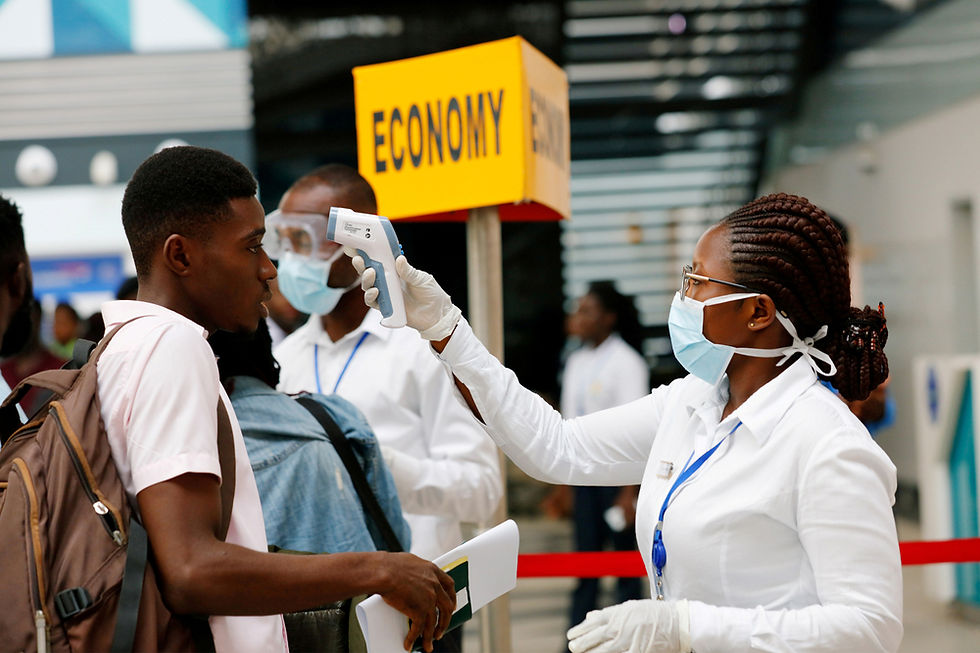Africa's consumer confidence dropped in February over coronavirus concerns
- Team Insights

- Mar 12, 2020
- 3 min read
Updated: Sep 14, 2023

KASI consumer confidence (KASI CCI) dropped in February over coronavirus concerns and the economic implication of the pandemic in Africa; the index dropped 6 points to +3. Both the sub-index of current economic conditions and of future expectations dropped 4 and 6 points respectively. Cameroon’s consumer sentiment experienced the most significant movement falling 18 points from 16 to -2 as the socio-economic situation worsened while the risk of coronavirus in the country increases. The country reported its first case of coronavirus infection when a French citizen recently tested positive. As of March 11, two individuals have been tested positive in the country, amid fears that the virus could spread rapidly.

Africans are concerned with the coronavirus outbreak
The coronavirus outbreak that originated in China has quickly evolved into a global pandemic with over 100 countries affected to date. While the numbers of cases have reached over 120,000 globally with China, Italy, Iran leading the way. Africa has seen fewer cases (less than 150) with Egypt and Algeria leading in terms of cases tested positive. Remarkably, the number of coronavirus cases in Africa remains low even though China is one of Africa's largest trading partners. Perhaps, the relatively low prevalence in Africa can be explained by the poor or the lack of testing infrastructure or by the warm and dry conditions that are not conducive to the viral spread. Another helpful factor could be the youthfulness of Africa’s population, according to the UN World Population Prospects, over 70% of Africans are under 30yrs old, which would make the majority of African less vulnerable to the virus.
The countries with reported cases as of Wednesday, March 11, according to the World Health Organization, include the following:
Algeria -- 20
Burkina Faso -- 2
Cameroon -- 2
Democratic Republic of Congo --1
Egypt -- 59 (includes 1 death)
Morocco -- 3 (includes 1 death)
Nigeria -- 2
Senegal -- 4
South Africa -- 13
Tunisia -- 5
Togo -- 1
Despite the low prevalence of cases in Africa, we decided to launch a COVID-19 survey in 7 countries we cover each month and found that 85% of the people surveyed are concerned about coronavirus with 60% of the respondents citing that they are very concerned about the coronavirus. Incidentally, respondents in countries where individuals have been tested positive for the coronavirus are also the most concerned.
In Kenya, 69% of the respondents stated they were very concerned about coronavirus which is not surprising given the recent events in the country where passengers from China were released in the country without going through quarantine.
In Nigeria, 74% of respondents are very concerned with coronavirus. This is after the second coronavirus case was confirmed early this week. According to Nigeria’s health ministry, the person became ill after coming into contact with their index case, an Italian citizen who had traveled to Nigeria last month.

Despite their concerns, Africans don't expect to be affected by the coronavirus
When asked if they or someone they know expect to be affected by the coronavirus, 57% of respondents don't expect to be affected compared to 15% who say they could be affected. 28% of respondents say they don't know or are not sure if they or someone they know is going to be affected.

Medium-term impact in Africa
Two-way trade grew by just 2.2 percent in 2019 to US$208.7 billion, compared with a 20 percent rise a year earlier, according to official figures from China’s General Administration of Customs. China’s imports from Africa fell by 3.8 percent in the period to US$95.5 billion, while exports rose 7.9 percent to US$113.2 billion as Beijing sought new markets as a way to bypass the punitive trade war.

Some experts are warning of potential prices increase for products imported from China and sold in markets across Africa as a result of the coronavirus outbreak. As the pandemic persists and the world fight to contain the virus, shortages are bound to increase and prices will likely go up. It is too early to tell how much price will go up by or how the consumers in Africa will adjust to the new norm. We are seeing a signal from our consumer sentiment index with the purchasing power (inflation forecast) sub-index dropping down signaling higher inflation in the future.
We are launching a monthly COVID-19 tracker to measure the impact of the COVID-19 pandemic on consumer sentiment and brands in Africa. The data and insights will be available via our website and our portal. Feel free to contact us on info@kasiinsight.com if you would like to include your burning questions on COV-19 and other related questions in the KASI survey.
#coronavirusafrica #coronavirusblackpeople #covid19 #Kenya #Cameroon #Nigeria #Ghana #IvoryCoast #Tanzania #SouthAfrica
Contact our team today to explore how our consumer intelligence and economic intelligence can empower your decision-making process. Win with confidence with Kasi insights https://www.kasiinsight.com/thehub
Get the latest data, insights, and opportunities from KASI.




Comments